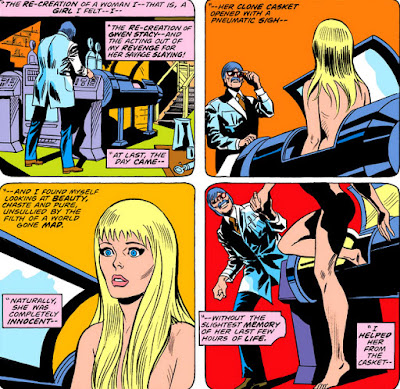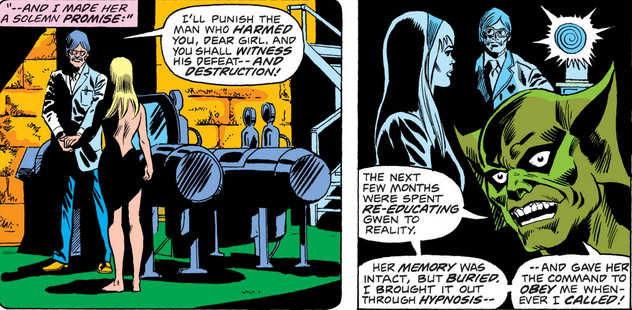Having recently raised an eyebrow at a Defenders tale which featured the return of Dracula to the land of the (un)living--the sight of which registered hardly any shock at all with Dr. Strange, even though the sorcerer had believed he had seen to Dracula's final death in a prior encounter--writer Roger Stern's later "fix" for that slight oversight brought to mind a number of other instances where writers were obliged to be creative in convoluted plots that were rather difficult to accept at face value, or, as was the case with Strange, a character needed to be extracted from a "tight spot" that was inadvertently left hanging and never resolved.
Following are a few such instances that sprang to mind for me, and I feel certain that many of you have some of your own to share, so please feel free to put on your thinking caps along with yours truly. :D
In terms of convoluted plots, it's hard to top this little gem, which opened the door to a virtual tsunami of clone convolution that went on for decades.
Send in the clones--and send them Marvel did, starting with Gwen, who turns out to be the creation of the Jackal, a.k.a. Prof. Miles Warren, who took the original Gwen's death quite hard and decided in his deranged mind that it need not be the case.
How a clone of Gwen emerged with all of the original's memories is anyone's guess; it certainly qualifies for an entry in the PPC's Weird Science category, to be sure. The success of the Gwen-clone (and, hard on her heels, the Peter-clone) storyline spawned clone stories ad nauseam. Gwen's clone even caused a little convolution of her own down the line, giving birth to twins who were manipulated into seeking revenge against Spider-Man for their mother's death. And the identity of their father? Norman Osborn. That's right, you heard me.
Then there's Captain Marvel, who hopscotched through a number of changes in powers and abilities before ending up as the Protector of the Universe, which you have to admit is quite a leap up the ladder even for a former Kree soldier. The road to Mar-vell's refits probably started with his unexpected audience with an all-powerful entity named Zo:
Which not only gave Mar-vell an upgrade, but also made Zo his unofficial benefactor as well as an entity for him to answer to, neither of which would do for the Mar-vell who was closing in on the 1970s and would receive honors from the Kree Supreme Intelligence. And so "Zo" turns out to be an elaborate deception by the Imperial Minister, Zarek, and Ronan the Accuser, both traitors to the Intelligence, with the hows and the whys crammed into over two pages of explanation.
Over in Fantastic Four, Reed Richards has just informed the human race that Earth need never again fear the coming of Galactus, since Reed has arranged for Galactus' ship to carry him into the Negative Zone, which would accommodate his hunger indefinitely.
And yet Galactus does return--but why? Who abandons a practically guaranteed source of unlimited sustenance, a realm so plentiful with worlds that he need not even send out a scout to locate one? The question is never really answered (except as part of a PPC Marvel Trivia Question)--but the matter is dealt with, after a fashion.
Even cartoon characters aren't spared the wand of revelation, as we discover when Reed assembles a mobile computer that has already made a name for itself in the animated arena of television.
Going back in time a bit, to the earliest issues of the Mighty Thor title, a storyline dared to ask the question: What happened to the original son of Odin, whom Donald Blake presumably took the place of? We discovered "the answer at last"; but years later, we received another answer, in the form of what appeared to be the real McCoy.
Naturally, we were obliged to look to Odin for elucidation, whose schemes and plans would often call for the use of a machete to hack our way to the truth:
Take your time, Red. Better men than you have tried when it comes to Odin.
A doppelganger also made his appearance in early issues of X-Men, even as we were witnesses to a tragedy:
And yet, though this was billed as the death of Professor X, imagine the looks on the faces of the X-Men when their teacher and mentor later wheels into their midst alive and well, in a definite jaw-dropping moment--with hopefully one heck of an explanation. One we indeed received, to either facilitate a reappearance of a classic character in order to either stave off the impending hiatus of a mag which may not have been doing so well on the stands, or to close out the title on a high note.
Finally, we come to our friend, Dr. Strange, who pays a visit to vampire/detective Hannibal King on behalf of his secretary, Sara Wolfe, to investigate the recent activities of Dracula--which comes as news to Strange, considering that up to this point he'd believed Dracula's status was as a corpse, slain by Strange's own hands. Yet now his sorcerous probing reveals that he and Dracula indeed met again since then, while Strange was in the company of the Defenders--an encounter he has no memory of, thanks to a demon who had good reason to deceive Strange as part of a greater scheme.
Now all we need to know is: How can a sorcerer who guards against the subtle intrusions of an entity such as Nightmare be vulnerable to having his mind tampered with by a demon like Mephisto? Perhaps that's a loose end that will be picked up down the road, as well.


























7 comments:
Beyond wrenching back the dial on Moments of Pivotal Drama, there is another reason I find these "startling" returns to be tedious. There is a fundamental rule of good writing that goes "Show, don't tell."
Don't give me two pages of bombastic muck trying to explain how you're screwing up continuity. Don't have a single panel waving away the fact that a preeminent cosmic force in our universe fled the Negative Zone because of the whimwhams. SHOW me!
The only one I reckon deserves a passing grade is the return of Professor X. It was succinct, fit the situation and life went on. (Well, maybe if I had been a big X-Men fan at the time, I would have been hit harder by the professor's death and thus be more outraged at the reverse)
Professor X's reappearance was very timely - two issues before the comic was cancelled.
If the series had been cancelled before those two issues, then to the Marvel universe, Prof X would have effectively been dead. When the New X-Men started would they have had the audacity to resurrect him then? Would the New X-Men have even existed without the Professor to bind everything together? Who's to say.
Roger Stern was good at explaining things. He also did a "fix" where he explained how Mr. Hyde--a guy who could keep Thor occupied for at least a few minutes, could later get knocked out by Captain America with one punch. Or defeated by Daredevil. The explanation? He was low on Hyde Serum!
That makes sense, I guess.
Remember the Elf, from Defenders? I think they never should have "fixed" that one. He got run over by a moving van. That's enough explanation for me.
They don't gotta make it an alien conspiracy.
M.P.
You raise a good question, Tiboldt. The one binding aspect to the X-Men has always been Xavier's dream of peaceful coexistence between mutants and humans, or, perhaps better put, mutants and nonmutants, in spite of those instances where the X-Men found that to be something of a pipe dream. Xavier, after all, seldom operated in the field and, aside from an isolated incident, mostly avoided first-hand exposure to the hatred and bigotry of those the X-Men have tried to placate and educate; in other words, Xavier offered hope, where the X-Men saw the brutal reality of so-called humanity. Yet that dream is what set X-Men apart from other titles, and what set the X-Men themselves apart from other heroes. It's hard to imagine the new X-Men, who had spent their lives thus far unsheltered by Xavier's school, banding together to embrace a principle like Xavier's without the man himself there to offer his steadfast belief in it. I could see Colossus and Banshee giving it some consideration; Sunfire, Wolverine, and Thunderbird, on the other hand, would have rejected the notion outright; Nightcrawler, having been exposed himself to what's out there (from torch-bearing villagers out to stake him, no less), would likely have sympathized with them; and Storm, seeing such dissent, might simply have lost interest and returned to the veldt.
I don't understand how Galactus can just fly to the Negative Zone as if it was somewhere else in the universe. I thought the Negative Zone existed in another dimension, another plane of reality etc which was accessible only by certain routes such as the gateway in Reed Richards' lab.
That panel showing Reed speaking to the world is full of stereotyped images of other nations - I love the English gent wearing a bowler hat and monocle :D
What if Professor X had actually died (for keepsies)?
Your discussion of the grand picture of the New X-Men is interesting, but I have to bring up a key, in-universe plot point. If Prof. X didn't return from the dead in "X-Men" #65, then life on Earth would be as Z'nox slaves or, best case, Earth would have a long stretch of rebuilding. It depends on how fast the Avengers and/or F.F. could respond with no advance warning to the alien threat. According to the flashback posted, Prof. X had detected the Z'nox threat and was trying to come up with a defensive strategy. Some sort of (mutant?) arrogance had him choose NOT to share this threat intelligence with anyone else. At all.
Maybe the New X-Men would form as an underground resistance unit against the Z'nox? Or otherwise band together in the rebuilding from the rubble situation.
I was not a fan of the Z'Nox - the entire story felt like a knock-off silver-age JLA tale. I'm sure the Z'Nox reappeared but they never reached the heights of other alien invaders.
Speaking of alien invaders, the Avengers would go on to defend Earth against both a Skrull invasion and Thanos's space armada, and the Z'Nox didn't look tough compared to them.
To quote an unnamed science officer in X-Men #105, "Captain! This planet has faced Galactus four times in its immediate planetary history and beaten him back!" which prompted a Shi'ar Captain (who bore no resemblance to Captain Kirk, honest) to turn tail and run.
Post a Comment